Gender, Neoliberalism and Research in the
advertisement
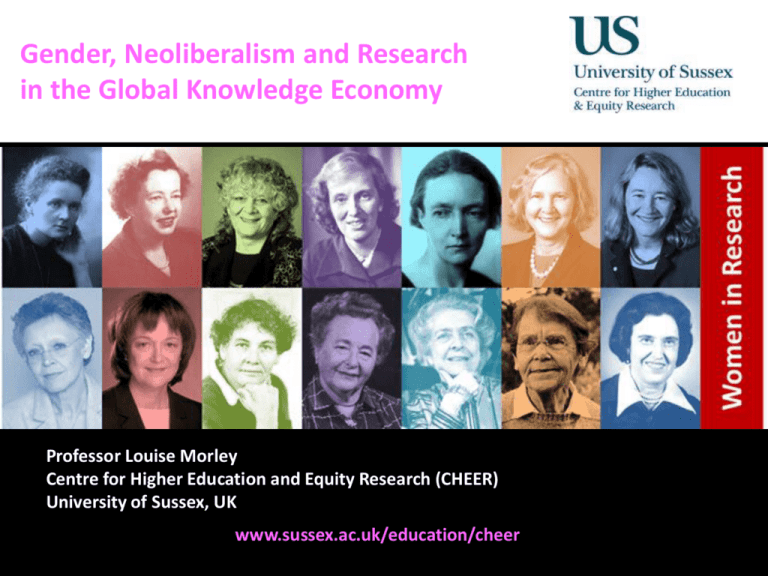
Gender,Diversity, Neoliberalism and Research Democratisation and Difference: Theories and Methodologies in the Global Knowledge Economy Professor Louise Morley Centre for Higher Education and Equity Research (CHEER) University of Sussex, UK www.sussex.ac.uk/education/cheer Provocations • Academic research aligned with the political economy of neoliberalism = • Research valued for its commercial, market, financial benefits. + • On-going misrecognition/ underrepresentation of women as research leaders. = • Highly gendered and exclusionary research economy. • Political Economy of Neoliberalism • Normative order of reason and governance • All spheres of existence are framed and measured by economic terms and metrics • Persons and states construed on the model of the contemporary firm/ maximising current and future value/ attracting investors • Market principles frame every sphere and activity, from mothering to mating, from learning to criminality, from planning one’s family to planning one’s death (p67). • Equality, liberty, inclusion subordinate to the project of: economic growth competitive positioning capital enhancement (Brown, 2015) Neoliberalism is not… • An external, material entity • A seamless, monolithic, stable apparatus - easily identified and resisted (Ball 2012; Larner 2000). • Non-human • Essentially male (Rottenburg 2013) • Just about injury or subjectification (Gill 2010; Leathwood & Read 2013; Lucas 2006) Neoliberalising Research: Financialisation and Globalisation Financialisation of research = truth about its quality? Higher education placed within a system of accounts (McGettigan 2013) • Targets • Accountability • Competition • Income-generation • Entrepreneurship • Performance Management • Commercialisation • Knowledge Mobilisation/ Impact • Positional Advantage/ Prestige Economy Not • Criticality • Scholarly independence Entangling Research and Neoliberalism? • Truth-telling: peer review, appraisal (Ball 2014) • Academic identities constructed via metrics/ management by numbers (Ozga 2008) • Discursive, symbolic and material rewards for those servile to the priorities of the market? • Success/ failure values/ narratives circulate • Opportunities for competition, exhibitionism and self-promotion • Affective economy- guilt, pride, shame, fear • Binary of winners and losers • Does this coincide with gender binaries? Women’s Credibility Deficit Women less likely to be: Journal editors/cited in top-rated journals (Tight, 2008). Principal investigators (EC, 2011) On research boards Awarded large grants (Husu, 2014) Awarded research prizes (Nikiforova, 2011) Conference keynote speakers (Schroeder et al., 2013 ) Women likely to be: Cast as unreliable knowers Longino, 2010). (Code 1991; Why Does it Matter? • Individuated agency is privileged. • Logic of collective political struggle against structures of inequality undermined. • Metrics imply norms. • Which norms are evoked in judging research value? • Research priorities determined outside epistemic communities. • Future of feminist scholarship? Disqualifying Counter-Hegemonic Discourses? ... If governmental authorities stipulate what topics may be funded, they contribute to a public discourse that shifts the common understanding of the line that divides legitimate from illegitimate academic inquiry... The point here is not just that a person may not get funding for a project if he or she adheres to certain views or engages in certain activities, but also that certain views are no longer considered ‘fundable’ and so are regarded as socially illegitimate. This can only have a deleterious effect on freedom of speech in the academy... (Butler, 2006: 129-131). Absent Talent: Women in Research and Academic Leadership (2012-2013). • British Council Seminars Hong Kong, Tokyo, and Dubai. • Total of 72 participants from South and East Asia, the Middle East, North Africa, Australasia and Europe. • 20 surveys, 3 discussion groups, 3 panels, and 13 presentations). Do Women Matter in the Research Economy? Research Authority Does not Stick to Women It is the mindset of the organisation that senior positions should only be held by male colleagues and the perception that conducting research is a ‘masculine’ job which can be carried out better by male researchers (Malaysian woman academic). Gendered Division of Labour Women are found in low professional titles, low-level management and administrative positions, most of them are responsible for student affairs (Chinese woman academic). Gendered Networks and Lack Sponsorship from Neoliberal Winners Exclusionary Practices Quite often editing roles aren’t advertised, you are tapped on the shoulder ... there are many other things: the narrative, the discourse, that impede women (British woman academic). It also requires the capacity to play politics, be aligned with the right people, get publications in the right journals and win research grants (Australian woman academic). Women Narrating • • • • Precarity Unbelonging Exclusion Lack of research authority/ credibility • Affective economy e.g. pride, shame, humiliation, guilt, fear. In Summary • Research and researcher identities constructed/ reinforced via rationalities/apparatus of neoliberalism • The social is disintegrating into the entrepreneurial • Knowledge production, custody, dissemination processes: neutral and objective? overlap with social and policy hierarchies? • How to resist co-option by narrow research policy agendas? • How to materialise women’s research identities? • How to ensure the future of feminist research? Follow Up? • Morley, L., & Crossouard, B. (2016). Rejection, Refusal, Reluctance, Revisioning: Women in Higher Education Leadership in South Asia. Studies in Higher Education. http://dx.doi.org/10.1080/03075079.2016.1147749. • Morley, L. and Crossouard, B. (2016). "Gender in the Neoliberalised Global Academy: the Affective Economy of Women and Leadership in South Asia." British Journal of Sociology of Education 37(1): 149-168. • Morley, L. et al. (2016) Managing Modern Malaysia: Women in Higher Education Leadership. In, Eggins, H. (Ed) The Changing Role of Women in Higher Education: Academic and Leadership Challenges. Dordrecht: Springer Publications. • Morley, L. (2015) Troubling Intra-Actions: Gender, Neo-liberalism and Research in the Global Academy. Journal of Education Policy. 31(1): 28-45. • Morley, L. (I2014) Lost Leaders: Women in the Global Academy. Higher Education Research and Development 33 (1) 111–125. • Morley, L. (2013) "The Rules of the Game: Women and the Leaderist Turn in Higher Education " Gender and Education. 25(1):116-131. • Morley, L. (2013) Women and Higher Education Leadership: Absences and Aspirations. Stimulus Paper for the Leadership Foundation for Higher Education. • Morley, L. (2013) International Trends in Women’s Leadership in Higher Education In, T. Gore, and Stiasny, M (eds) Going Global. London, Emerald Press.
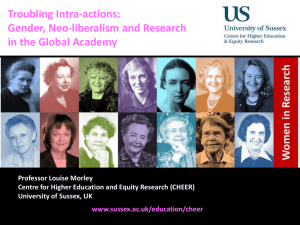
![Lost Leaders: Women in the global academy [PPTX 2.59MB]](http://s2.studylib.net/store/data/014998803_1-252f9c1d601e20ae1438f34c563b3f59-300x300.png)

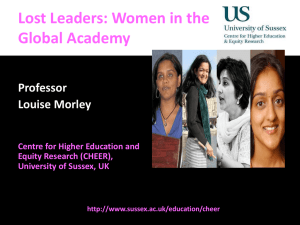
![Lost Leaders: Women in the global academy [PPTX 2.22MB]](http://s3.studylib.net/store/data/009263777_1-be1374436717e20566e88e79cec67d26-300x300.png)
![Diversifying Higher Education Leadership [PPTX 21.11MB]](http://s2.studylib.net/store/data/014998801_1-697fa0ed698db3ffbac3745ff444b92d-300x300.png)
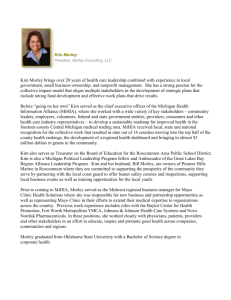

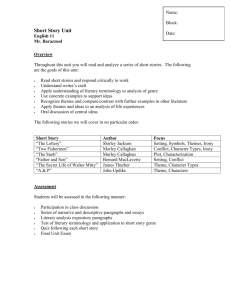

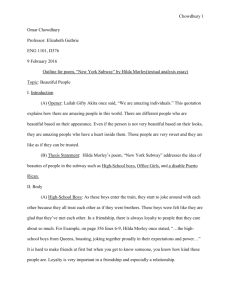
![Gender mainstreaming in higher education [PPTX 1.25MB]](http://s3.studylib.net/store/data/009261055_1-dfa19b70fcd91637c7a1dbd1bc939bd3-300x300.png)